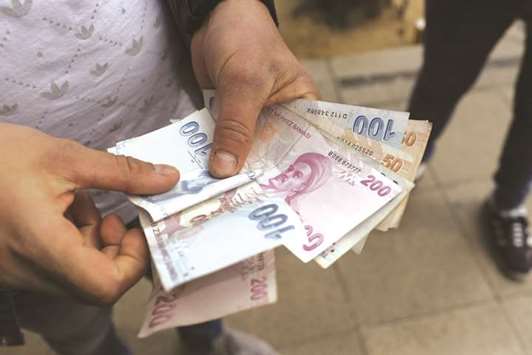Turkey’s central bank surprised markets with a bigger-than-expected rate increase, a move aimed at supporting the lira and bonds in the weeks leading up to early presidential elections in June.
Policymakers increased the late liquidity window, the rate it uses to set bank funding costs, for the first time this year by 75 basis points to 13.50%, surpassing the median estimate in a Bloomberg survey for a 50 basis-point move. The lira, which has fallen against all major currencies this year, gained more than 1% after the announcement before reversing.
The move helped ease concern among foreign investors that President Recep Tayyip Erdogan’s disdain for higher borrowing costs would stop the central bank from acting even though inflation is more than double its target.
Erdogan is seeking to consolidate his grip on power in a nationwide vote on June 24.
“The government may not complain about that ahead of the elections in June,” said Ziad Daoud, the chief Middle East economist for Bloomberg Economics in Dubai. “But things could get tougher after the vote: further efforts to tighten policy will come up against a more powerful president, and one who’s very critical of higher rates.”
In its decision yesterday, the central bank said it would deliver further tightening if needed. It kept the one-week repurchase, overnight lending and borrowing rates unchanged, in line with expectations.
In a significant departure from previous language in interest rates decisions, the bank said it decided to implement a “measured” tightening in policy to counter rises in Turkey’s imports bill.
The lira, which rallied immediately after the decision, was trading 0.1% lower at 4.0918 per dollar at 3.02pm in Istanbul. Yields on 10-year government bonds fell two basis points to 12.67%. The decision may fail to support the lira should the dollar strengthen globally, according to Piotr Matys, a strategist at Rabobank in London. Elevated inflation levels could also render the step insufficient to support the currency, said Cristian Maggio, the London-head of emerging market strategy at TD Securities.
“A year ago, rates at 13.50% would have been enough,” Maggio said. “Not anymore because high inflation is deeply entrenched.”
Central bank governor Murat Cetinkaya said on the weekend that he’d increase borrowing costs “if needed” to anchor the currency, which has the potential to swing in the weeks leading up to the vote. If Erdogan wins in June, it means he can complete the transformation of the political system agreed in a referendum a year ago, including eliminating the prime minister’s job and weakening the role of parliament.

A customer counts Turkish lira banknotes after visiting a currency exchange in Istanbul (file). Policymakers increased the late liquidity window, the rate it uses to set bank funding costs, for the first time this year by 75 basis points to 13.50%. The lira, which has fallen against all major currencies this year, gained more than 1% after the announcement before reversing.
